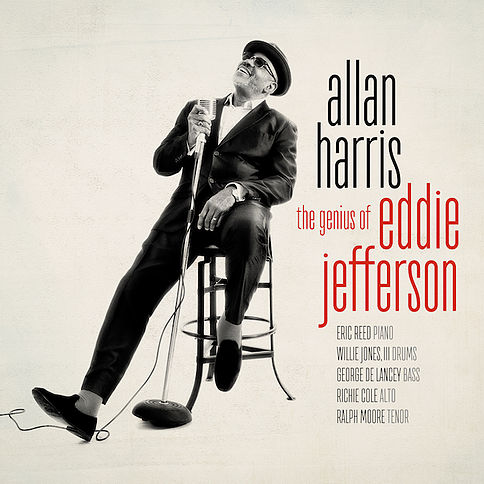
“Harris has honed an accessible, musically rigorous style and proven himself not just a survivor, but an artist of continual growth.” —JAZZTIMES
Featured Videos
THE EDDIE JEFFERSON PROJECT
Eddie Jefferson was a melodious crooning poet of what Jack Kerouac called bop prosody — a bebop devoted verse-writer and performer possessed of a lyrical gift for conversational storytelling and highflying narration based in the jazz life and jazz talk of his era. Charlie Parker famously said “Music is your own experience, your thoughts, your wisdom. If you don’t live it, it won’t come out of your horn.”
Jefferson’s great innovation from a creative literary perspective was to extract and extrapolate hip, relatable narrative from jazz heads and horn solos — to construct virtuosic soliloquys out of the swung abstraction of rhythmatized improvisations and melodies.
The most memorably inventive hiphop lyricists — Rakim, Big Daddy Kane, KRS One, Chuck D, De La Soul, A Tribe Called Quest readily come to mind for this fan of golden era of rap wordsmithery — possess a similar talent for making sure each graf of verse conveys a singular point of view grounded in the African American vernacular and musical culture of their time. And lyricist (as opposed to vocalist) Jefferson’s biggest commercial hit, 1949’s “Moody’s Mood For Love” an ingenious adaptation of James Moody’s burning and yearning tenor response to the call of that melancholic standard, is a well-known proto-rap predecessor to many within vinyl-jazz-knowledgeable rap circles—especially the many with jazz-collecting dads.
Allan Harris and his esteemed cohort deserve applause for returning the jazz world’s attention to this protean pioneer of vocalese and to treating Jefferson’s body of renditions as a classic canon in their own right.
The choices include inevitable tour de forces such as Jefferson’s take on Miles epic trumpet exposition on “So What” and the galvanic heads of Horace Silver’s “Filthy McNasty” and “Sister Sadie” which most fans over 50 will surely recall from the halcyon jazz radio years of their 20s and 30s. But the inclusion of Jefferson’s collaboration with Dexter Gordon also allows us to peep how Jefferson really felt about rocking as compared to bopping — which was competitive in the best way and ready to take the battle to the dance floor.
Harris is a more stately and grounded vocalist than the exuberantly, ecsatatically eccentric Jefferson, but the leader’s natural reserve and impeccable verve renders the genius of Jefferson choices in lyric and lilt remarkably transparent. Harris brings a veteran’s confidence and maturity to the introspective balladry required of “Body and Soul” and to the tricky and acrobatic uptempo twists and turns demanded by “Filthy.”
That the band includes alto saxophonist Richie Cole who shared stages with Jefferson for years (right up until literally the night of the singer’s tragic death) is an added energizing coup. Kudos should go as well to the tenor of Ralph Moore, to the always elegant and propulsive ivories of Eric Reed and to the rhythm section riptide provided by the kickass duo of drummer Willie Jones and bassist George Delancey.
— Greg Tate
